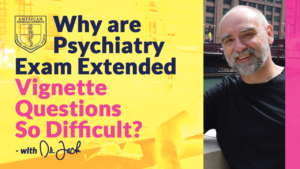Below is a transcript of the video – it has been edited for clarity.
Today I am going to discuss diagnostically focused questions on the psychiatry boards. You want to recognize the core diagnostic features. There can be a challenge with these diagnostically focused questions as the DSM-5 has a lot of disorders and each disorder has quite a few criteria.
These challenges can make it hard to learn all of the criteria for all these disorders, especially for… Click to Read More
What to Do if You Fail Your Board Exam
I’m here to talk about a difficult topic with you today. What do you do if you fail your board exam? I know that this is likely a difficult time for you, but I do not want you to be so hard on yourself. Take some time to come to terms with this and then create an action plan for how you are going to do better next time. There is a silver lining when it comes to failing your board exam because we are more than passing or failing an exam.
How to Study for Board Exams More Effectively
Today, I focus on how to study more effectively based on the Landscape of Knowledge. I categorize new information we learn into three tiers of understanding: data, information, and knowledge. A exam candidate can fool themselves into believing they understand the material through familiarity with it even when they haven’t converted it into knowledge through active learning. Here are specific examples that illustrate these points.
Studying for the Boards: 5 Tips to Minimize Procrastinating
Welcome. It’s Dr. Jack and I have 5 tips for you on how to minimize procrastination when it comes to studying for the boards.
Tip 1: De-Emotionalize the Job You Have to Do
My first tip is based on a thought experiment. I’d like you to take a minute to imagine that you have a clone of yourself, and your clone is identical to you. They have the same bright smile and winning personality that you do. There is… Click to Read More
Fear of Board Exam Failure
Fear can make us behave in counterproductive ways, including how we respond to an upcoming medical board exam, such as a neurology or psychiatry board exam. We have set ways of responding to fear – fight, flight or freeze. Classically, fear is defined as an emotion triggered by imminent danger, as we would experience if we saw an aggressive person running toward us or if we heard breaking glass in our house as we were lying in bed. Anxiety is… Click to Read More
Levels of Board Exam Questions
One way I’ve found categorizing board exam questions helpful is to view them in a hierarchy of three levels, each one building on the previous one and requiring greater use of one’s clinical judgment. My three levels are: Know It → Recognize It → Decide It. Now let me explain and I promise this will be practically helpful and, I believe, comforting even.
Know It
This lowest level of question relies almost exclusively on recalling some specific piece of information… Click to Read More
Screen Functions on ABPN Board Exams
Today I respond to two questions regarding the what information is available on the exam screen on ABPN® board exams.
Lab Values on ABPN® board Exams
I received a question from a psychiatry board exam candidate this week about whether normal lab values are available as a drop down list accessible from the exam screen. We received a response from ABPN® as follows: “We do not provide a drop down list of normal lab values, but when the committee feels… Click to Read More
Differentiating Diagnoses on Psychiatry Board Exams
Here’s an important board exam fact: you can study, study, and still further study the DSM-5 and still incorrectly answer diagnostically-focused psychiatry board exam questions. How can this be? If you have ever felt that your exam performance is not as good as your knowledge base suggests it should be, the following insight will partly explain this discrepancy.
The discrepancy between knowledge and performance arises from a discrepancy between what you spend your time studying (and memorizing) and what the… Click to Read More
Board Exam Prep: How to Avoid Study Procrastination
I received a request from a colleague preparing for their psychiatry board exam. Today I tackle this fairly common problem in board exam prep by explaining procrastination, its formation, and treatment.
Procrastination is a type of avoidance, and avoidance is a common strategy used by many to cope with unpleasant life situations and also is part of several psychiatric conditions. Any disorder with “phobia” in its name is a type of avoidance. The problem with avoidance is that often it… Click to Read More
Transforming Board Exam Question Data into Exam Performance
Have you ever had the experience of performing worse on a multiple-choice exam than you knew your knowledge base allowed? If so, this post is for you. To explain where the disconnect between how much you know and how you scored on a board exam may occur, I explain the relationship between four concepts: data, information, knowledge, and exam performance. I provide examples, and then invite you to consider where your “disconnect” in this chain of data processing occurs. Let’s… Click to Read More
Sleep and Board Exams
I’m about to tell you something so obvious you may want to throw something at me. Despite the apparent obviousness, many exam candidates still will make the mistake I’m about to describe and do so for entirely understandable reasons. Let me explain why sleep and board exams is so important.
On the day (or several days) prior to your exam, your anxiety level likely will increase. You may realize you are not as prepared as you would like to be… Click to Read More
Why Are the Psychiatry Vignette Board Exam Questions So Difficult?
Extended vignette questions now comprise half of the Psychiatry Certification Exam and one-quarter of the Psychiatry MOC Exam. This vignette type of multiple-choice question is easy in that the topics are not designed to trick you or to cover obscure points. And at the same time, they are very hard because they require you to make render a judgment among options that are shades of gray. Listen to Dr. Jack present a detailed and uplifting presentation on how to handle… Click to Read More
Pacing Yourself on Your Psychiatry Board Exam
I’ve received several emails from doctors who’ve recently taken their psychiatry board exam. Here are some quotes that I present to you anonymously and then provide my responses.
“I recently took the Psychiatry Board exam and I honestly don’t know what to think. I was struggling with time. The vignettes were super long….one of the video was about five minutes long. I did take about four breaks but honestly didn’t have time to eat lunch. I finished about five minutes… Click to Read More
Treatment Interventions on Board Exams
It’s not a secret that board exams test your knowledge of the details of the myriad treatment interventions on board exams used in treating patients. In addition to knowing the circumstances of when to choose a particular intervention over another (discussed in other posts), you are expected to know the details of each specific treatment intervention. Thus, the question that arises for the exam taker is “just how much detail about treatment interventions do I need to know?”
Each field… Click to Read More
Recognizing Zebras in Clinical Vignettes
The medical boards pride themselves on presenting multiple-choice questions that are clinically-relevant and fair. In other words, the boards are not trying to trick you. This means that most clinical vignettes will describe patients with a common form of a disease or disorder. After all, these are the cases most of us physicians spend our days assessing and treating. However, as clinicians we do need to recognize the rare condition. So the question is, how do you distinguish whether the… Click to Read More
Treatments in Specific Patient Populations
Medical board exams include a high percentage of treatment-focused questions, since appropriate treatment is what patients seek from physicians. Specialty board exams test three aspects of treatment:
Details of specific treatment interventions
Treatments in specific patient populations and by disease variants
Treatment algorithms
This post focuses on choosing the right treatment for a patient based on that patient’s specific population or disease variant. Board exam question writers test your ability to know which treatment interventions apply to particular forms of… Click to Read More
Treatment Algorithms on Board Exams
Medical board exams primarily test clinical knowledge. As such, questions that assess your knowledge of treatment interventions are common. There are three aspects of treatment that can be tested:
Details of specific treatment interventions
Treatments in specific populations and by disease variants
Treatment algorithms
Treatment algorithms on board exams are the focus of this post. Treatment algorithms are a rank ordering of treatment interventions beginning with first-line treatments proceeding to second-, third-, and fourth-line treatments, and ending at last-line treatments… Click to Read More

















